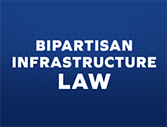Fact Sheet: Innovative Coordinated Access & Mobility Pilot Program

BIPARTISAN INFRASTRUCTURE LAW FACT SHEET
INNOVATIVE COORDINATED ACCESS AND MOBILITY PILOT PROGRAM
| Fiscal Year | 2022 (in millions) |
2023 (in millions) |
2024 (in millions) |
2025 (in millions) |
2026 (in millions) |
|---|---|---|---|---|---|
| Innovative Coordinated Access and Mobility Pilot Program |
$5 | $5 | $5 | $5 | $5 |
Program Purpose:
The Bipartisan Infrastructure Law, enacted as the Infrastructure Investment and Jobs Act, continues to provide funding for the Innovative Coordinated Access and Mobility (ICAM) pilot program, which funds capital projects to improve coordination and enhance access and mobility to vital community services for older adults, people with disabilities, and people of low income.
Statutory References:
FAST Act § 3006(b)
Eligible Recipients:
Eligible applicants include state departments of transportation, designated recipients for Formula Grants for the Enhanced Mobility of Seniors and Individuals with Disabilities (49 U.S.C. § 5310) funds, or local governmental entities that operate a public transportation service, or their eligible subrecipients that have the authority and technical capacity to implement a regional or statewide cost allocation pilot.
Eligible Projects:
The range of capital activities eligible under the ICAM program, include:
- financing innovative projects for the transportation disadvantaged that improve the coordination of transportation services and non-emergency medical transportation services;
- regional or statewide mobility management projects;
- deployment of coordination technology; and
- regional or statewide projects that create or increase access to one-call/one-click centers.
What’s Changed?
- The Bipartisan Infrastructure Law does not amend the ICAM pilot program.
